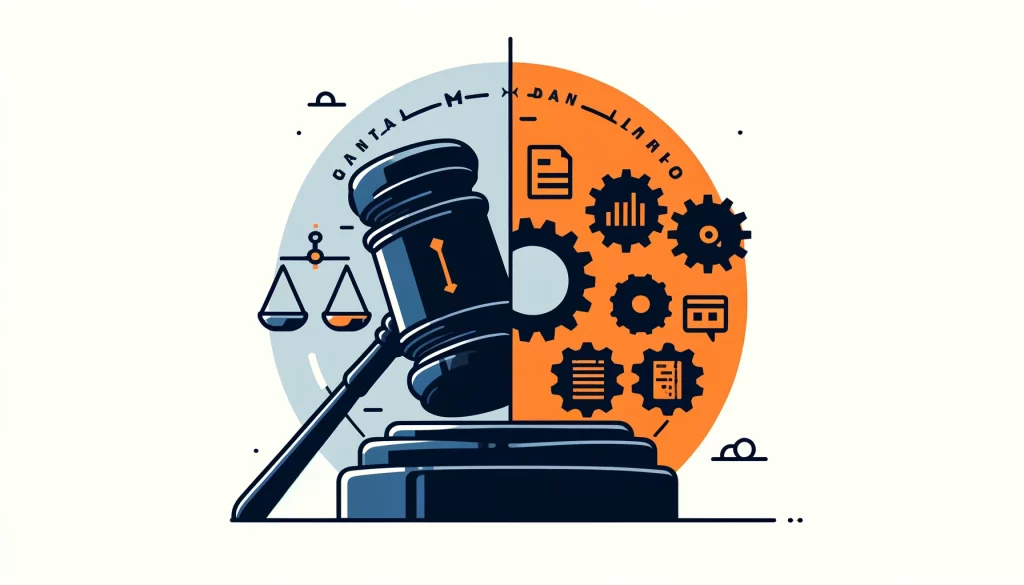
Data Governance vs Data Management: Key Differences and Synergies

In the vast world of data, two important concepts often go hand in hand: data governance and data management. While people frequently use these terms interchangeably, they represent distinct, yet interdependent facets of an organization’s overall data strategy. Businesses need to know the distinctions between data governance and data management to maximize their data assets.
Data Governance
Data governance makes rules for data use, while data management organizes and cares for data. By grasping these distinctions, businesses can effectively utilize their data assets to drive success. This article aims to illuminate the unique characteristics of each function and explore how they synergistically contribute to effective data utilization.
Data governance serves as the north star for an organization’s data management practices. Data governance includes rules and procedures for managing, accessing, and using data. These rules and procedures are in place from the beginning to the end of the data’s life cycle. Data governance acts as a guiding compass, ensuring that an organization’s data practices align with its strategic objectives, regulatory requirements, and ethical principles.
Key components of a robust data governance framework include:
- Data Stewardship: Assigning ownership and accountability for specific data assets to ensure consistent management and decision-making.
- Quality Standards: Defining benchmarks for data accuracy, completeness, timeliness, and consistency to support reliable analytics and decision-making.
- Security and Privacy Policies: Protect private information and ensure data security by setting rules.
- Lifecycle Management: Establishing policies for data creation, storage, retention, archival, and disposal to optimize data value and minimize risk.
Effective data governance requires collaboration among cross-functional stakeholders, including executive leadership, business domain experts, IT professionals, legal counsel, and compliance officers. The diverse governance body is responsible for creating, communicating, and enforcing data governance policies that encourage responsible data stewardship.
Data Management
Data management is like the engine that makes data governance work. Management includes the methods and tools used to collect, store, process, and provide data for business needs. The hands-on, day-to-day execution of governance policies and standards is essential.
Data management spans a wide array of critical functions, including:
- Architecture: Designing and implementing the structural foundation for data storage and integration, including databases, data warehouses, and data lakes.
- Data Integration: Collecting data from different sources and storing them for analyzing and use. Data Integration involves gathering data from various sources. It also involves transforming the data to align with each other. Finally, systems store the data for analyzing and utilizing.
- Data Quality Management: Implementing processes and tools to monitor, measure, and continuously improve the accuracy, completeness, and consistency of data assets.
- Metadata Management: Capturing, organizing, and maintaining descriptive information about data assets, including business definitions, lineage, and relationships.
- Data Security and Access Controls: Implementing technical safeguards such as encryption, authentication, and authorization mechanisms to protect data from unauthorized access, modification, or disclosure.
The execution of data management tasks typically falls within the purview of IT departments and specialized data management teams. These professionals work in concert with business stakeholders to translate data governance policies into actionable solutions that enable efficient and secure data utilization.
The Synergy Between Data Governance and Data Management
Data governance and data management are different but connected, working together to ensure effective organization and control of data. Governance provides guidance and rules for handling data. Management implements these rules and develops the necessary technology for successful data governance.
Some key points of intersection between data governance and data management include:
- Policy Enforcement: Data management processes and tools should follow the policies and standards set by data governance.
- Regularly review and update data governance policies. You should do this to ensure alignment with business needs and regulatory requirements. You should use insights and feedback from data management practices for this purpose.
- Working together: Good data governance and data management need business and IT teams to work closely together. In this way, we can make policies that work technically and ensure solutions meet business needs.
- Data management teams must regularly share reports and measurements with data governance bodies. This is to demonstrate compliance with rules and identify areas for improvement.
Organizations can create a cycle of continuous improvement by aligning data governance and data management. Governance policies inform management practices, and management insights refine governance strategies.
Conclusion
Data governance and data management are essential for organizations to make the most of their data and its value. Governance sets rules to manage data consistently, securely, and in line with business goals. Management makes policies real through technical solutions and daily operational processes.
Strong data governance and management practices are essential. The data landscape is becoming more complex and continues to grow. This makes it crucial to prioritize these practices. They ensure that they properly manage and effectively utilize data.
Companies that focus on developing strong skills in these areas will be able to use their data effectively. They will also be able to make better decisions and gain a competitive advantage that will last.
Datasunrise provides tools to help improve data governance, security, and compliance. Our suite of tools makes it easier to find data, keep it secure, and meet regulations.
Datasunrise helps organizations securely manage their data. It audits sensitive information, provides real-time protection, and masks data. This allows organizations to effectively navigate data governance and management.
